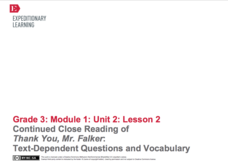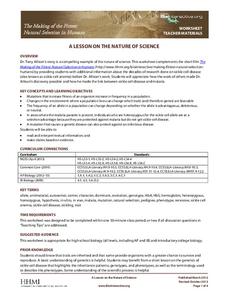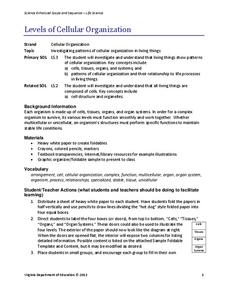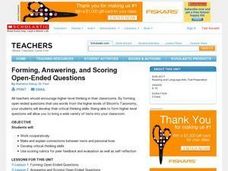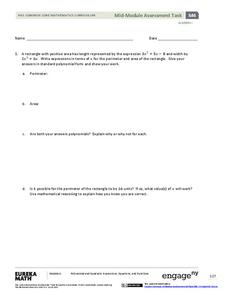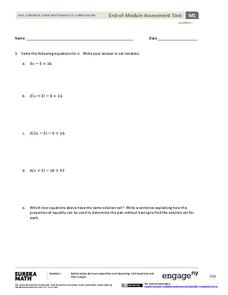Curated OER
Hoot: Bloom's Taxonomy- Questioning Strategy
What better way to examine a text than to ask your own questions? Use Bloom's taxonomy to guide kids through Carl Hiaasen's Hoot by asking questions based on knowledge, comprehension, application, analysis, synthesis, and evaluation.
Curated OER
Story Map for Crime and Punishment Part I, Chapters 1-5
While reading chapters one through five of Crime and Punishment, focus your readers with this guide. Eight questions are given here, encouraging the reader to study the protagonist and the struggles that ensue with the surrounding...
Curated OER
Alice's Adventures in Wonderland and Through the Looking-Glass Theme of Exploration
Guide your learners to develop themes in Lewis Carroll's Alice’s Adventures in Wonderland and Through the Looking Glass. Here is a handy resource that poses abundant higher-level thinking questions on topics in the books from...
Howard Hughes Medical Institute
A Lesson on the Nature of Science
If you are looking for a great way to present natural selection in humans, look no further. This handout is intended to accompany the 14-minute video The Making of the Fittest: Natural Selection in Humans, which can be found on the...
Inside Mathematics
Two Solutions
Many problems in life have more than one possible solution, and the same is true for advanced mathematics. Scholars solve seven problems that all have at least two solutions. Then three higher-level thinking questions challenge them to...
EngageNY
Continued Close Reading of Thank You, Mr. Falker: Text Dependent Questions and Vocabulary
In the second lesson plan in a series that revolves around the story, Thank You, Mr. Falker, learners practice the skill of answering direct questions from the text while using complete sentences. After a teacher-led review of how to...
Brigham Young University
A River Runs Through It: Blooms Taxonomy
Designed for teachers who use Norman Maclean's autobiographical A River Runs Through It, this one-page resource offers discussion question structured using Bloom's Taxonomy.
Curated OER
To Kill a Mockingbird Study Guide Part II
Focus your class's reading of To Kill a Mockingbird with this resource. Eighty-three questions are provided for chapters 12-31, the majority of which focus on plot recall. Since this is a word document, you can consider adding questions...
Novelinks
The Little Prince: Blooms’ Taxonomy Questions
Question what you read with a lesson based on Bloom's Taxonomy. As kids read The Little Prince by Antoine de Saint-Exupéry, they formulate questions with cues from a graphic organizer, and answer them to work on critical thinking skills.
Newseum
Putting the Consumer's Questions to Work
Who, what, when, where, why, and how are good questions to ask when evaluating a source. First, scholars find two sources of information relating to a chosen topic. Next, pupils complete a worksheet to gauge the source's credibility....
Howard Hughes Medical Institute
A Lesson on the Nature of Science
If you are looking for a great way to present natural selection in humans, look no further. This handout is intended to accompany the 14-minute video The Making of the Fittest: Natural Selection in Humans, which can be found on the...
Curated OER
Reading Comprehension
In this reading comprehension worksheet, students answer higher level thinking questions based on thought provoking words in their questions. Students complete 5 higher level thinking questions.
Virginia Department of Education
Levels of Cellular Organization
What an eccentric way to learn about each level of cellular organization! Allow emerging biologists to utilize white paper and create their own foldable charts to describe each level of organization in the body. You may also adapt the...
Curated OER
Developing Open-Ended Questions
Students work in groups of two to develop questions and sample answers that are relevant, accurate and use higher level of thinking skills about a literary unit. Students present their questions and answers to the class as a review of...
Curated OER
Forming, Answering, and Scoring Open Ended Questions
High schoolers explore higher level thinking. They develop their critical thinking skills by answering open ended questions. Students work cooperatively and make and explain connections between texts and their personal lives. High...
Curated OER
Papyrus to PDA
What a great project. Graphic arts students consider the social, political, and economic impact made by a chosen invention. They build an argument to substantiate their reasons for choosing said invention. They create an oral...
EngageNY
Mid-Module Assessment Task - Algebra 1 (module 4)
Performance task questions are the most difficult to write. Use this assessment so you don't have to! These questions assess factoring quadratics, modeling with quadratics, and key features of quadratic graphs. All questions require...
CK-12 Foundation
Black Hole
What happens to radio waves, time, and light in and near a black hole? Young scientists explore what is known about observing frequency and time at various distances from a black hole. They control the size of the black hole and the...
EngageNY
End-of-Module Assessment Task - Algebra 1 (Module 1)
What do your young geniuses really know? Assess the procedural knowledge of your pupils at the same time as their higher-level thinking with an assessment that identifies their depth of knowledge. Topics include solving...
College Board
2001 AP® Environmental Science Free-Response Questions
Water quality testing often reveals interesting facts about the local environment. Scholars respond to several AP® questions highlighting topics such as air pollution, water pollution, and the spread of disease. Each question requires a...
CK-12 Foundation
Ramp and Piano
Can you lift a piano into a truck? Simulation allows scholars to explore the relationship between force, ramp length, and weight. Pupils control the variables of truck bed height, ramp length, weight of piano, and the number of friends...
Oregon Museum of Science and Industry (OMSI)
DNA Extraction
What does your DNA actually look like? Use simple materials with this experiment to find out! Geneticists of all ages can follow these instructions to extract their own DNA. For learners who are hoping to extend the activity, there are...
Curated OER
Eight Things You Should Know About Online College Courses
Massive open online courses are changing the face of higher education, offering both opportunities and obstacles.
Novelinks
The True Confessions of Charlotte Doyle: Cognitive Enhancement
Put your thinking cap on, it's quiz time! Here, scholars use their knowledge of the book, The True Confessions of Charlotte Doyle by Avi to create six questions to be used in their upcoming quiz.







